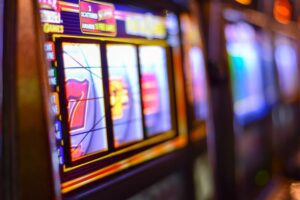What Is a Gambling Addiction Disorder?
 A gambling addiction disorder, also known as compulsive gambling, is a mental health disorder characterized by a persistent and recurring urge to gamble despite the negative consequences that may result from placing bets. Gambling can become addictive because you experience the thrill of winning, anticipation from placing bets and awaiting a specific outcome, and the joy of competing with other gamblers.
A gambling addiction disorder, also known as compulsive gambling, is a mental health disorder characterized by a persistent and recurring urge to gamble despite the negative consequences that may result from placing bets. Gambling can become addictive because you experience the thrill of winning, anticipation from placing bets and awaiting a specific outcome, and the joy of competing with other gamblers.
Gambling is a game in which you make predictions for a chance to win money. It’s also defined as taking risks in hopes of a desired result. There are many places where you can gamble, which increases the risk of being affected by this disorder. Knowing where people can gamble may help you understand what gambling is and how to recognize when it becomes a problem. In some cases, gambling and alcoholism go hand in hand, which creates an even more difficult situation.
Here are places you or your loved one who has a gambling addiction disorder may go to gamble:
- Casinos: Casinos are establishments that offer various types of gambling activities, such as slot machines, table games, and sports betting. Most often, casinos are located near tourist attractions, such as popular cities or resorts.
- Online: Online gambling can be accessed from anywhere with an internet connection, making it a convenient option for many people. There are multiple websites that provide opportunities to place bets on a variety of games, events, and other occurrences.
- Racetracks: Horse racing and greyhound racing are popular gambling activities in the U.S., and racetracks are often the primary location for these types of events. Many racetracks also offer additional gambling activities, such as slot machines and table games.
- Lotteries: Lotteries involve purchasing a ticket for a chance to win a large cash prize. This type of gambling is very popular and available in all regions of the U.S.
How Does a Gambling Addiction Affect Loved Ones?
A gambling addiction can also negatively affect the friends and family of a person with this addiction. Here are effects of a gambling addiction that loved ones may experience:
One consequence that can be felt by both a gambler and their loved ones is financial difficulty. A gambling addiction may cause debt and bankruptcy. In extreme cases, you may lose assets such as your house. As a family member, these may be finances you share with a gambler that you lose due to their addiction. Or you may feel the financial burden of gambling when someone who is addicted asks for money or needs help to afford necessities when gambling takes priority.
Another effect a gambling addiction has on loved ones is a strain on relationships. The person with the addiction may prioritize gambling over spending time with friends and family. Or they may default on responsibilities such as caring for children or maintaining a household.
Addiction causes a lot of emotional distress for spouses, family, and friends. Not only can a loved one become overwhelmed when a gambler neglects responsibilities but they may also experience stress from worrying about how the addiction is affecting them and their loved one.
It’s not uncommon to develop trust issues when dealing with someone who has an addiction, especially a gambling addiction. This is because gamblers often lie about their condition. Trust issues may cause more emotional distress if family and friends feel guilty for losing their faith in you. Guilt may also be felt if family and friends are enablers to your addiction. All of these aspects can harm relationships.
It’s important to note that you may need to seek help as a person who is affected by a gambling addiction, even when you yourself don’t suffer from this disorder. You can learn to understand addiction and repair relationships by attending family therapy. This type of therapy can also help resolve the other negative effects of a gambling addiction.
What Are the Signs Your Loved One Has a Gambling Problem?
A gambling addiction can be difficult to recognize because there are often no physical signs or symptoms. However, you can recognize a gambling addiction by looking for the common signs of a gambling addiction. Most of these signs are actions that you, a family member, or friend may take while struggling with a gambling addiction.
Here are the most common signs of a gambling addiction:
A person with a gambling addiction may be preoccupied with thoughts of gambling. They may spend a significant amount of time planning, engaging in, or thinking about gambling. With gambling addiction disorder, a person often neglects other areas of their life in order to prioritize gambling.
A person with a gambling addiction may increase the frequency of their gambling behavior, gambling more frequently or for longer periods of time than they intended. You may notice that your family member or friend is spending a lot of time at or around gambling sites such as casinos or racetracks. If they gamble online, it may be difficult to recognize this sign.
A person with a gambling addiction may begin to bet higher amounts. The need to increase the amount of money they wager is a result of trying to achieve the same level of excitement or satisfaction from previous wins. This is why gambling can be detrimental even when a person is winning.
A gambling addiction is also characterized by difficulty controlling gambling behavior. This includes placing bets despite negative consequences such as financial problems, relationship difficulties, or legal issues. Someone you know may have a control impulse disorder when they continue to gamble even after you confront them about the distress it’s causing.
A person with a gambling addiction may experience financial problems, such as borrowing money or taking out loans to fund their gambling behavior. If a friend or family member is constantly asking you for financial help, there may be an underlying problem, such as addiction. You can try to help with an intervention for their apparent addiction. Interventions are also helpful for friends and family members to address how the addiction is affecting them.
A person with a gambling addiction may hide their gambling behavior from family or friends, or lie about the extent of their gambling behavior. Lies are an obvious indicator of this type of problem. A person with a gambling addiction tells lies to themselves so they can continue with their habit. They also lie to family and friends about where they are, how they’re spending money, and how serious their gambling has become.
A person with a gambling addiction may experience withdrawal symptoms when they try to stop gambling, such as restlessness, irritability, or anxiety. Just like with a substance abuse disorder, when someone has gambling addiction disorder they become dependent on the highs gambling brings. These symptoms can cause someone to resume gambling rather than seek help for the addiction.
Common Lies Gamblers Tell
 Individuals may reveal their addiction through deceptive behavior. There are common lies that gamblers tell in order to hide and continue their addiction behaviors. Some common lies include:
Individuals may reveal their addiction through deceptive behavior. There are common lies that gamblers tell in order to hide and continue their addiction behaviors. Some common lies include:
- “I can stop anytime I want.”: Those who struggle with addiction often convince themselves that they’re in control and can quit at any time. Without treatment for addiction, this is rarely the case.
- “I won big!”: Someone with a gambling addiction may exaggerate their winnings in order to justify their continued behavior.
- “I’m just borrowing money.”: Rather than admitting to their money problems, someone with a gambling addiction may try to borrow money so they can continue gambling.
- “I’m due for a win.”: Even when they lose consecutively, someone who gambles may continue with the belief that they’re about to win.
- “I can’t talk right now.”: It’s common for people with an addiction to avoid others and pretend that they’re busy so they don’t have to talk or spend time with people that may interfere with their behavior.
- “I’m not hurting anyone.”: A gambling addiction can be detrimental to the gambler and everyone around them, but to justify the behavior, it’s common to pretend that gambling can’t hurt anyone.
- “I didn’t touch the money.”: It’s also common for people with a gambling addiction to lie about money. They may tell elaborate stories about what happened to money they lost, or deny having spent any money.
How To Deal With a Gambler in Denial
If you’re dealing with a gambler in denial one of the best things you can do is express your concern and encourage them to get professional help. It can be challenging to talk to a gambler in denial because often they’re unable to see the negative effects and attribute them to gambling.
There are a few strategies that you can use to help someone in denial of their addiction and protect yourself from experiencing the consequences with them:
- Encourage them to seek help. It’s important to get professional help to recover from addiction. Some may need intensive inpatient care while others can benefit from finding an addiction therapist to cope with and overcome a gambling addiction disorder.
- Provide support. Let your loved one know that you’re concerned about their behavior and want to help them. Having a honest conversation with them about how their addiction is affecting you may make a difference. Offering your support can be beneficial to their mental state.
- Set boundaries with them. If someone you know has a gambling addiction and it’s affecting you, you may have to create boundaries to protect yourself. This may involve limiting contact or stopping any financial assistance you might offer.
- Educate yourself on addiction. Learning more about gambling as a problem and the available resources there are to help may show you how to deal with another’s addiction. You can look to support groups, counseling, or self-help resources.
- Be careful not to enable addictive behavior. You might be enabling a gambling addiction by lending money or covering for lies. While these actions may seem like you’re being supportive of someone in need, you’re really just helping them continue their addiction.
How To Cope With a Spouse’s Gambling Addiction
 There are several ways to cope with a spouse’s gambling addiction, including therapy and setting boundaries. Dealing with someone who has a gambling addiction can be different for a spouse because you’re likely experiencing all the consequences of a gambling addiction that the addict may have. This includes relationship problems, financial trouble, and emotional distress. However many of the previous strategies apply. For example, you want to be careful not to enable your spouse, but still, give them support and encouragement to seek help.
There are several ways to cope with a spouse’s gambling addiction, including therapy and setting boundaries. Dealing with someone who has a gambling addiction can be different for a spouse because you’re likely experiencing all the consequences of a gambling addiction that the addict may have. This includes relationship problems, financial trouble, and emotional distress. However many of the previous strategies apply. For example, you want to be careful not to enable your spouse, but still, give them support and encouragement to seek help.
Spouses often have shared finances so one thing you can do is limit access to credit cards and bank accounts. Setting boundaries around finances can limit your spouse’s ability to gamble. It also prevents you from falling into debt.
You and your spouse may consider couples therapy as well as individual therapy. This can help restore your relationship. Therapy may also give you tools for offering support and talking to your spouse about a gambling addiction.
Addiction Treatment At Northern Illinois Recovery Center
Our team at Northern Illinois Recovery Center can help you or your loved ones manage and overcome addiction. We have many different treatment programs that offer a range of help, from individual therapy to resources for you and your family to cope with addiction.
Call us today to find out how we can help you, your family, or your friends cope with addiction.




